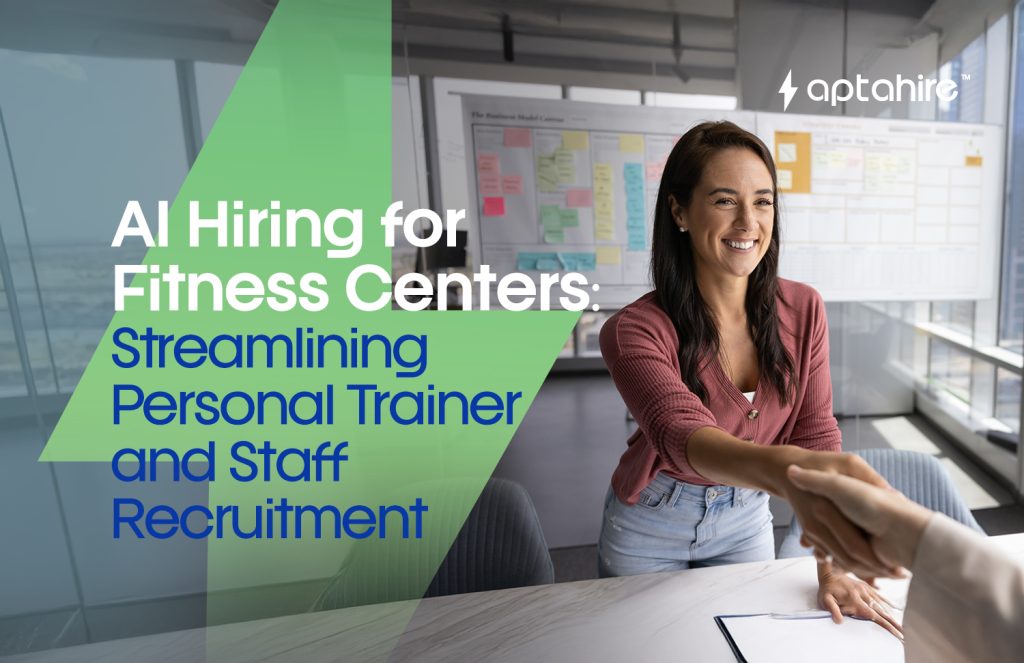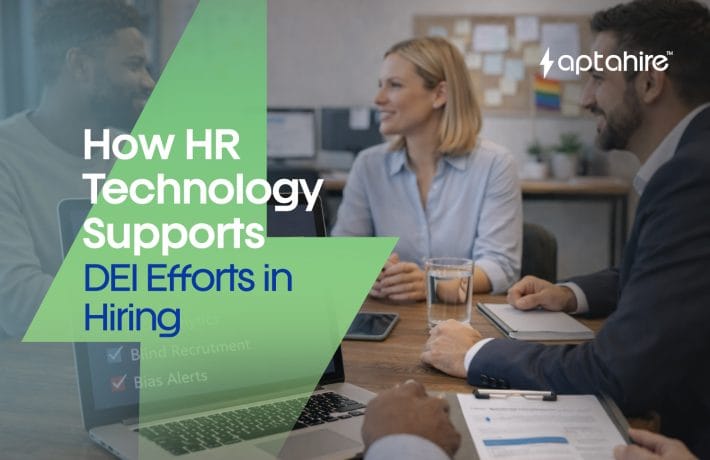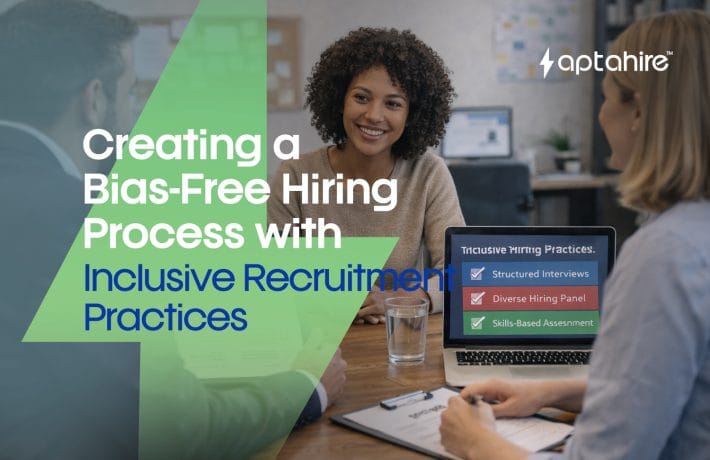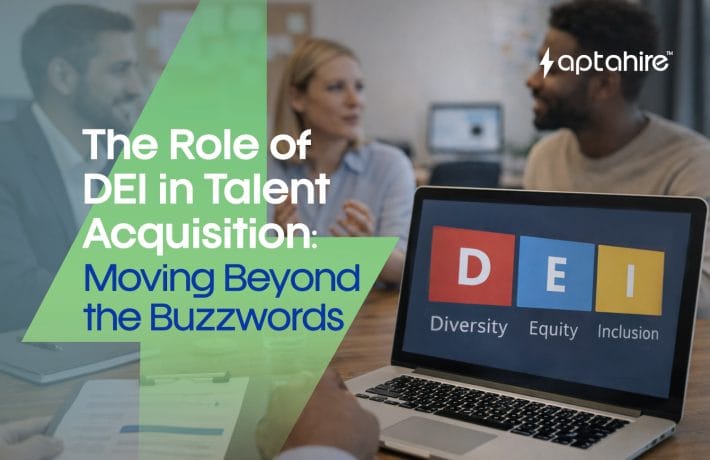AI Hiring for Fitness Centers Streamlining Personal Trainer and Staff Recruitment

Introduction: The Fitness Industry’s Hiring Challenge
Imagine you run a fitness center. You’ve got membership drives, seasonal fitness trends, and ever-changing class schedules, and with growth comes the need for more trainers, front-desk staff, and support teams. But finding the right people can feel like trying to bench-press a mountain of resumes.
Welcome to the era where Artificial Intelligence is your recruitment partner. AI doesn’t just sort resumes, it understands certifications, specialties (like strength, Pilates, or group classes), availability, and even personality fit. It helps fitness clubs hire smarter and faster, turning what used to take weeks into a streamlined process that feels effortless.
In this blog, we’ll explore how fitness clubs, from boutique studios to multi-location gyms, are using AI-powered tools to transform hiring. Think automated candidate screening, AI interviews, and data-fueled insights: all while ensuring ethical, inclusive, and transparent HR practices that align with EEAT principles.
1. Identifying Specialized Talent with Precision
Hiring for a fitness center means matching client expectations: certified personal trainers, yoga instructors, recovery coaches, or virtual class leaders. AI tools can recognize certifications, relevant experience, and even emerging skills like fitness-tech literacy. These tools learn from historical hiring patterns and use predictive modeling to recommend top candidates.
For example, if you’re hiring for a strength and conditioning coach, AI will prioritize candidates with relevant certifications (e.g., NSCA, ACE), experience in athlete training, and even high client retention scores from previous roles. This precision reduces mismatch and improves client satisfaction.
2. Speeding Up Recruitment Cycles
Fitness centers often face urgent hiring needs, when a new location opens or a trainer suddenly resigns. AI dramatically reduces time-to-hire. Tools powered by machine learning automate initial screenings, sort through applications in minutes, and even conduct asynchronous video interviews.
By pre-qualifying candidates based on required certifications, availability, and cultural fit, AI helps clubs fill roles faster, minimize downtime, and maintain service continuity, a crucial factor in member retention and revenue protection.
3. Candidate Engagement and Smart First Impressions
AI doesn’t just screen, it converses. AI chatbots and virtual assistants can interact with applicants via text or voice, gathering information, scheduling interviews, and answering FAQs. Candidates feel attended to instantly, which improves their experience and reflects well on your brand.
For instance, a candidate applying for a yoga instructor role might be asked about their preferred teaching times, class size comfort levels, and availability for weekend sessions. AI records and processes this data in real time, making the handoff to human recruiters smooth and seamless.
4. Predictive Fit & Long‑Term Potential
AI tools can evaluate more than just hard skills. By analyzing behavioral data from interviews and assessments, AI predicts cultural fit and long-term retention potential. This is especially important in the fitness industry, where member loyalty is closely tied to the personality and consistency of trainers and staff.
For example, AI might detect that a candidate who uses empathetic language and scores high on communication is more likely to thrive in member-facing roles like group class instruction or onboarding.
5. AI-Assisted Onboarding & Training
Once a candidate is hired, AI doesn’t stop working. Virtual onboarding assistants can deliver step-by-step orientation modules, simulate customer interactions, and assess understanding through quizzes and role-playing. This ensures all hires receive consistent and thorough onboarding, even across multiple locations.
New front desk staff, for instance, might interact with an AI bot that walks them through gym software, payment systems, and client escalation protocols. This approach enhances learning, reduces training costs, and shortens ramp-up time.
6. Data-Driven Decision-Making & Strategy
AI doesn’t just execute; it informs. Recruitment dashboards display live data on applications, interviews, time-to-hire, dropout rates, and skill shortages. For fitness chains planning to scale, this kind of workforce intelligence is gold.
Imagine knowing three months in advance that your summer bootcamp locations will require 10% more group instructors than last year, based on historical trends. AI makes this predictive hiring possible, giving fitness centers a serious strategic advantage.
7. Ensuring Fairness, Ethics & Transparency
With AI comes responsibility. Fitness centers must ensure their recruitment tools are inclusive, bias-free, and legally compliant. This includes:
- Removing biased data inputs
- Explaining how AI makes decisions
- Offering opt-out options for candidates
- Regular auditing of AI performance
Building trust with applicants is essential, especially in a people-first industry. When candidates understand that AI supports, not replaces, the human process, it builds credibility and comfort.
8. Real-World Edge: Why Fitness Centers Thrive with AI
AI adoption is growing in fitness centers for good reason:
- Scalability: Hire dozens of instructors during seasonal spikes
- Consistency: Uniform hiring practices across all locations
- Retention: Predict which hires will stay longer
- Candidate Satisfaction: Reduce ghosting and improve follow-through
Whether it’s a gym hiring for front desk support or a luxury wellness club seeking elite instructors, AI makes the process faster, smarter, and fairer.
9. Tips to Get Started with AI Hiring
| Step | Action | Value |
| 1 | Identify core roles (e.g., trainers, desk staff, nutritionists) | Clarifies hiring focus |
| 2 | Choose AI tools with fitness-relevant filters (certifications, availability) | Boosts match accuracy |
| 3 | Run a pilot program for one location or role | Low-risk entry into AI hiring |
| 4 | Combine AI output with human interviews | Ensures balanced decisions |
| 5 | Monitor results and refine AI workflows | Improves long-term ROI |
Conclusion: A Human-Centered AI Hiring Future
The future of hiring in the fitness industry is not about removing the human touch—it’s about elevating it. AI helps centers hire more effectively by reducing guesswork, improving speed, and surfacing the best talent. But it’s still human managers, coaches, and recruiters who bring heart and context to each hiring decision.
For fitness centers ready to grow, adapt, and stay competitive, AI hiring isn’t a luxury—it’s a necessity. When used ethically and strategically, it becomes the secret weapon to building a high-performing, engaged, and people-focused team.
Whether you’re a single-location studio or a national gym chain, embracing AI hiring can help you find the right trainers, support staff, and specialists who align with your mission of helping people live healthier, stronger lives.
FAQs
1. How is AI used in the fitness industry?
AI is used to personalize workouts, track progress, and offer virtual coaching through apps and wearables. It also analyzes user data to provide nutrition advice and fitness recommendations. Additionally, AI helps gym owners automate scheduling, manage memberships, and recruit staff.
2. Can you use AI as a personal trainer?
Yes, many apps use AI to act as virtual personal trainers by generating customized workout plans. These systems adapt to your fitness level and goals using real-time data. They also provide feedback on form and performance through motion tracking or camera input.
3. Is AI going to replace personal trainers?
AI can assist or complement personal trainers but is unlikely to fully replace them. Human trainers offer emotional support, motivation, and personal connection that AI can’t replicate. However, AI enhances efficiency and personalization in fitness routines.
4. How to get an AI trainer job?
To work with AI in the fitness space, you typically need a mix of fitness certification and tech literacy, especially in AI tools. Roles may include fitness tech consultants, app testers, or content creators for AI training platforms. Staying updated on digital trends and earning AI-related certifications is key.
5. How do you use AI for recruitment activity?
AI helps screen resumes, schedule interviews, and assess candidate fit using behavioral and skill-based data. It shortens the hiring cycle and reduces human bias. In fitness centers, AI can quickly identify qualified trainers or staff based on specific job requirements.
6. What is a fitness function in AI?
A fitness function is used in algorithms like genetic programming to evaluate how close a solution is to the desired outcome. It helps AI decide which candidates (solutions) are best suited for the next iteration. The term doesn’t directly relate to physical fitness but to performance optimization.



